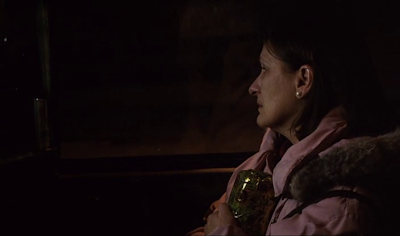 |
| Pa'no tayo umabot sa ganito? |
Perpetually hunched and pinched, Jacobo (Andres Pazos) owns a crumbling sock factory in Montevideo. There is a quiet dignity in his movements, a result, we surmise, of years upon years of overseeing an impersonal but reliable assembly line (there's a commentary here, too, on industrialist alienation, typified by talks on labor issues whilst picking colorful pastries). His languid stupor is broken when his brother Herman (Jorge Bolani) goes home from Brazil to visit. To put up a semblance of success in his life, Jacobo asks his assistant Marta (Mirella Pascual) to pretend to be his wife. Marta, as constant (and old) as the gears and pinions that animate the sock factory, agrees.
 |
| Ganda. |
How Jacobo and Marta treated this charade is for me the most articulate, satisfying facet to Whisky, how their response to an opportunity for escape eloquently defined who they are, what they have lost, and what they will do (if any) to regain it.
Easily the more transformed, Marta easily becomes invested on the role. She gets her hair done, applies makeup, and fixates on tiny details that will improve the performance (including the saddest couple portrait in perhaps all of cinema). She utters lines that are expected of her, and when a woman calls while Jacobo is out, she hangs up the phone, protective. From reserved and apathetic, she slowly opens up. In Piriapolis, she reveals to Herman that she can spell backwards. Clearly, this reversing of words and sentences, while the camera pans to sceneries, gestures toward a desire to turn back time. The final sentence she reverses is "Jacobo is exasperated."
 |
| :D |
We learn so much of the dynamic between the brothers when Herman offers Jacobo a wad of cash as "compensation" for having looked after their dying mother. What is unsaid here, of course, is that the money is compensation for a life wasted. While Herman has long moved on to a better place with a family of his own, Jacobo was just released from the burden and, in true Bona fashion, has nothing to look forward to now except a life of a barely discernible point. Too late comes to mind. And so the message undergirding the refusal was, too late; no thanks, fuck you.
 |
| It's over. |
This film's blatant fixation on mirrors tells me that these characters may all along have been self-reflexive in performing their roles. Jacobo knows he had become a zombie who has learned to reject any interruption of a routine that he has, for all intents and purposes, grown to love. Marta recognizes the charade as her only shot at escape, short-lived and fake it may be (she loves going to the movies, Christian would point out). Throughout the film, shots would cut their bodies in strange halves and shapes: while fixing the window (Jacobo, lower), hauling the oxygen tank (Marta, lower), crowding the tiny elevator window (the two's morose eyebrows and creased foreheads). Here are people, incomplete and stoic, trudging on.
Persistent, too, is a caller dialing the wrong number. "These things happen," Marta assures Jacobo, and us. These things happen. What exactly happens? By rendering the everyday as a confluence of fictions and myths, we wonder just how much of a performance lives are; just how many desires and whims are soothed by a superficial show of tenderness; if there is a tyranny that cannot be assuaged by an enthusiastic mouthing of a word that would physically arrange your facial muscle into a semblance of smile; if we, knowing this, can ask for more.

No comments:
Post a Comment